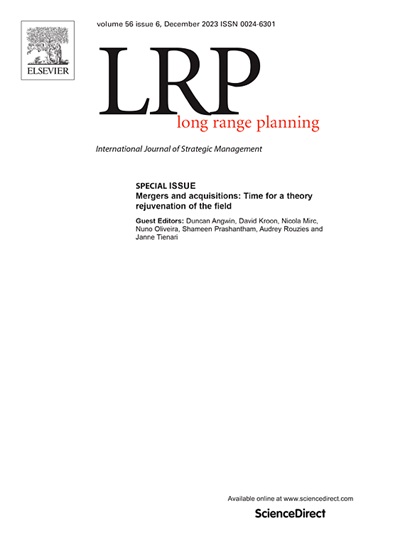Patent citations and acquisition premiums: A screeningperspective
IF 6.3
2区 管理学
Q1 BUSINESS
引用次数: 0
Abstract
While extant acquisition literature explores how intentional signaling between the acquiring and target firms can influence acquisition outcomes, we examine how unintentional information revealed through prior actions taken long before an acquisition is contemplated – specifically patent citation patterns between the firms – influences acquisition outcomes. We argue that targets can screen patent citation imbalances between acquirer and target to reduce information asymmetry regarding potential joint value creation. When the acquirer cites the target's patents more than the reverse, the target is better able to infer knowledge dependence or private synergies stemming from the complementary knowledge bases of each firm. The reduction of information asymmetry permits the target to capture a higher acquisition premium justified by these anticipated synergies or dependencies. Using a sample of acquisitions between US high-tech firms from 2005 to 2021, we find support for our thesis when the acquirer's patent portfolio is diverse.
专利引用与收购溢价:一个筛选视角
虽然现有的收购文献探讨了收购方和目标公司之间的有意信号如何影响收购结果,但我们研究了在考虑收购之前很久采取的先前行动中披露的无意信息(特别是公司之间的专利引用模式)如何影响收购结果。我们认为,并购目标可以筛选收购方和并购目标之间的专利引用不平衡,以减少潜在的共同价值创造的信息不对称。当收购者更多地引用目标公司的专利时,目标公司能够更好地推断出知识依赖或源于两家公司互补知识基础的私人协同效应。信息不对称的减少使目标公司能够获得更高的收购溢价,这些溢价是由这些预期的协同效应或依赖性所证明的。利用2005年至2021年美国高科技公司之间的收购样本,我们发现当收购方的专利组合多样化时,我们的论点得到了支持。
本文章由计算机程序翻译,如有差异,请以英文原文为准。
求助全文
约1分钟内获得全文
求助全文
来源期刊

Long Range Planning
Multiple-
CiteScore
13.00
自引率
7.10%
发文量
75
期刊介绍:
Long Range Planning (LRP) is an internationally renowned journal specializing in the field of strategic management. Since its establishment in 1968, the journal has consistently published original research, garnering a strong reputation among academics. LRP actively encourages the submission of articles that involve empirical research and theoretical perspectives, including studies that provide critical assessments and analysis of the current state of knowledge in crucial strategic areas. The primary user base of LRP primarily comprises individuals from academic backgrounds, with the journal playing a dual role within this community. Firstly, it serves as a platform for the dissemination of research findings among academic researchers. Secondly, it serves as a channel for the transmission of ideas that can be effectively utilized in educational settings. The articles published in LRP cater to a diverse audience, including practicing managers and students in professional programs. While some articles may focus on practical applications, others may primarily target academic researchers. LRP adopts an inclusive approach to empirical research, accepting studies that draw on various methodologies such as primary survey data, archival data, case studies, and recognized approaches to data collection.
 求助内容:
求助内容: 应助结果提醒方式:
应助结果提醒方式:


